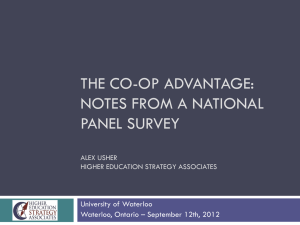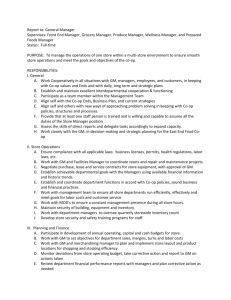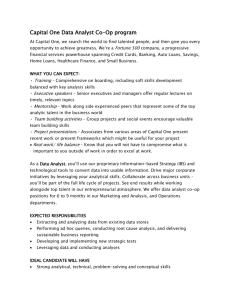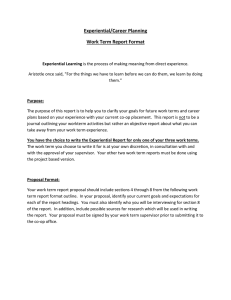a case study - The Co
advertisement
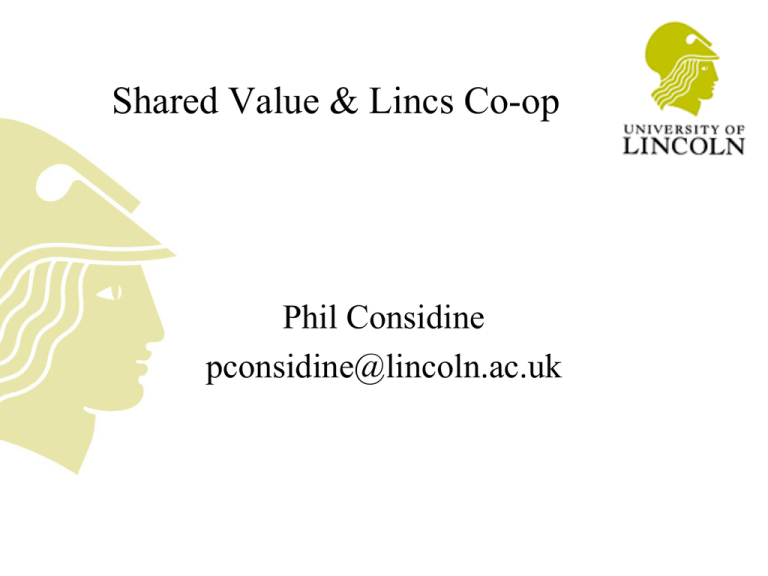
Shared Value & Lincs Co-op Phil Considine pconsidine@lincoln.ac.uk Changing Times • A major change in the perception of business and its role in creating value • Investor Owned Firms (IOFs) tend to view value creation as short term financial optimization with little thought of supplier viability or impact on communities who are central to their sustainability • The operating context is changing – Big society – Shareholder revolts Shared Value • Shared value has been defined as ‘policies and operating practices that enhance the competitiveness of a company whiles simultaneously advancing the economic and social conditions in the communities in which it operates’ (Porter 2011). • Can be done by redefining the concept of value – not simply the difference between costs and revenue • Reconceiving products & markets, redefining productivity in the value chain, building industry clusters. Friedman • The Social Responsibility of Business is to increase profits ‘The only social responsibility of business is to use its resources to engage in activities designed to increase profits as long as it stays within the rules of the game’ (New York Times Magazine 13 September 1970) • The global recession has shone a light on this worldview and found it wanting – organisations of all sizes are believed to be prospering at the expense of society. • the standard operating model of businesses consists of an outdated perception of how they create value and indeed of what constitutes value. • How organisations can create shared value is key to the redefinition of what capitalism means in the 21st century and how it might evolve into a system that meets the needs of its stakeholders in the widest sense. What is a Co-op? • Consumer Co-op – Provide consumption goods at the best price and value making income go further – Can include housing, utilities, health, leisure, financial services • Producer Co-op – Enables self employed small orgs and family businesses to gain the strength needed to survive in the market – Can include shared services, retailers • Worker Co-op – Provide what ILO calls ‘decent work’ – Can include labour only co-ops to large complex organisations Source Johnson B (2009) Lincs Co-Op • Owned by its members and members elect a board of board of directors who appoint the Chief Executive who appoints a management team. • Each member has a single vote and any member is eligible to stand for election as a director. • Ensure that the needs of the community and the best interest of the membership are fundamental to the organizational goals Methodology: Grounded Theory • Introduced in 1967 by Glaser & Strauss and developed further by Strauss & Corbin among others • Needed as a reaction against positivism in social research • GT offers a middle ground between extreme empiricism and extreme relativism • Based on constant comparison and theoretical sampling • Develops theory inductively • Eschews a priori hypotheses and theory • Focuses on research and discovery via direct contact with social world What GT is not • Not a methodological holy grail • Suitable in some instances not in others • Works well when trying to understand how meaning is constructed out of intersubjective experience or where no explicit hypothesis exists • Does not work well when examining objective reality IOF Model of CSR III. Adopt a cause Charity of the year Community Projects IV. After profit activities Donations Sponsorship Low I. Strategic CSR Before Profit Supply Chain Activities Motivational for staff Reputational benefit II. Relevant Activities Supporting themes Donations of IT kit Work with relevant charities & NGOs Integration High High Affiliation Low Questions • What values underpin Lincolnshire co-operative ? • What does ‘doing the right thing’ mean to Lincolnshire Co-operative? • Consider non business activities that Lincolnshire Cooperative support (or encourage employees to support) that you consider important – why are these important? • How do you show leadership in doing the right thing? • How does being a co-operative impact the above and why is it different from investor owned firms ? • How does Lcoop create value in its supply chain Values • • • • • • • • • • Community Engagement Members interest Ethical retail Doing good is in our DNA Benefits to members Local perspective Respect Sustainability Develop local community and businesses Sample Open Codes : from interviews were coded Traditional Values reinforced by managers Reporting to members focuses the mind Sources of power in the business, Generating power on site Importance of organisational culture Embeddedness of the culture Community links – part of the community not an adjunct Local products Developing staff Need to educate people about the environment, Aligning business agenda and initiatives, Senior management live the values Challenge of climate change Translating and communicating the issues Developing values and trust Customers expectations and trust Do the right thing (DNA) Go the extra mile, do more than needed Make a profit but not at any price Treat each other well Respect A trusted brand Linking innovation and environmental concerns A trusted brand, Linking innovation and environmental concerns, Empowerment and ethical decision making, Services to schools Forming alliances with external parties Ensure activities are aligned with the business strategy, Beauticians working in hospices Lifelong learning Community grants Building environmental sustainability into products, Risk assessment and decision making, Stories of heroes – cutting waste Stories of heroes – making profits Stories of heroes – helping the community Benefit stacking, enlightened self interest Concerns about costs Balancing economic and environmental issues Knock on effects of empowerment and creativity, Benefits of increased social capital Being a coop definitely impacts the values Importance of trust and honesty Climate change overrides all else I: Values Based • • • • • • • • • • Healthy Communities Leaders model the way Services to schools Business in the Community you can tell them about the values and what we stand for Community Initiatives link us back to our owners the structure helps with community involvement Every day is different I hadn’t realised until I came here just how involved in the community we are we don’t just get to a stage in your development and say well that’s it – we want you to improve Staff development is central to our business It helps with recruitment ? I: Values Based - Community • we’ve put XXX and another of our local suppliers together so that they can purchase some of their ingredients together so that they can both get a financial gain but also in a cooperative way of working together. That’s a clear one. So not only are we helping them out, increasing their purchasing power and using our knowledge and experience but we are developing the cooperative message as well. • I’m the local contact and get enquiries from local producers who are not ready to take the step at this stage but who want advice and so we do that – it’s free and we use that time to look at their packaging or how they are going to get the stage of being big enough and get in to a chain. So some of them will become suppliers and some will not but we give that time II: Relevant Activities • Community grants • Someone like AN Other retailer – they don’t have the same values they’re not Lincs focused • It’s part of what we do it guides us – but I don’t spend the day worrying about what’s going on with dictatorships • Volunteering • Local initiatives III. Adopt a Cause (IOF) • It felt like we were not lining shareholders pockets • You genuinely felt you were doing something • My targets are financial, so that’s what I do. This was different – it was giving something back • Community activities tend to be reactive – ‘we were phoned up by a local charity….’ • I think we did Children in need and it was fun • Charity of the year? • There are some national activities that happen but I’m not overly certain what they are. III. Develop Relationships • Bringing new businesses on by supporting their development • Supporting local initiatives and charities not just financially • Giving our time and expertise over a long period IV. After profit activities • It’s good to see that we make these donations • I think we sponsor local football teams • It’s just something we do • I think there’s tax breaks or something (IOF) • We find it difficult to measure any real benefit (IOF) III. Develop relationships Charity of the year Community Projects Long term alliances Support of local social enterprises Time and expertise I. Values based Local Community Develop local capacity Develop people Support the movement Structure reinforces values IV. After profit activities Donations Sponsorship II. Relevant Activities Healthy eating projects Partnering with PCT Educations (school/FE/HE) Supply chain activities Low Integration High High Affiliation Low ……It’s not all just financial. JS Tesco Morrison Lincs Coop Staff 152,000 519,671 131,207 2769 T/O £22bn £72bn £17bn £285m Gross per employee £5190 £7669 £9275 £30,335 Pre tax per employee £5256 £7380 £7217 £7439 Sense Making • Retrospective (Weick) • Social Process • Gaining an understanding of what people want and ascribing meaning • Relates to complex issues not everyday problems • Important where facts interact with beliefs values and norms Sense Making And Shared Value • Shared Value is complex • Sits on the intersection of facts, beliefs, values and norms • Is a social process • Is not retrospective • It is prospective sensemaking • It creates a shared vision of a desirable future What is Lincs Co-op • Is it a consumer Co-op – Yes • Is it a producer Co-op - It helps to develop local supply chain • Is it a worker Co-op - Interviews suggest that ‘decent work’ a core value • A new triple bottom line? Shared Value • Shared value has been defined as ‘policies and operating practices that enhance the competitiveness of a company whiles simultaneously advancing the economic and social conditions in the communities in which it operates’ (Porter 2011).

